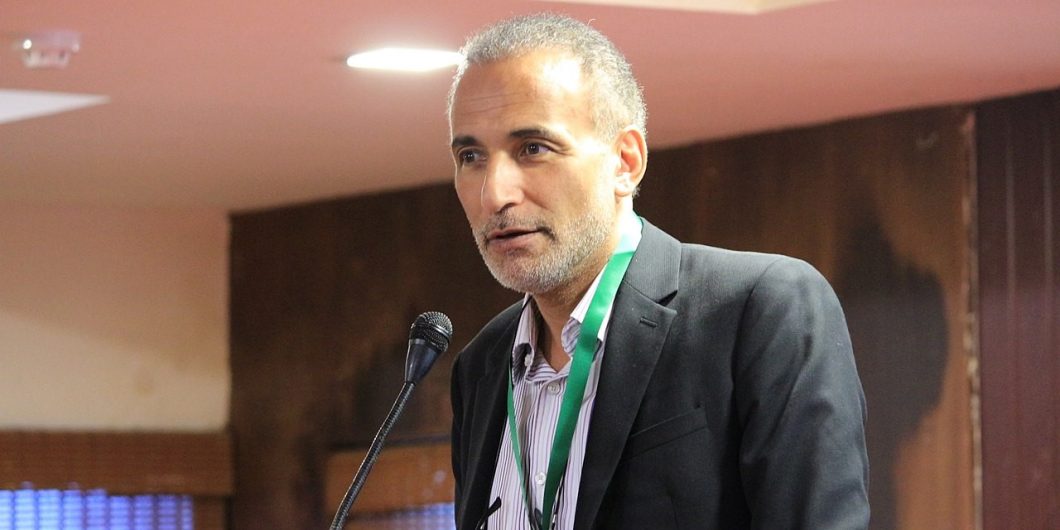Now that the “woke” activists at Harvard—intent on devouring their own—have humiliated an African-American trailblazer, who will be their next target?
The Sordid Tale of Tariq Ramadan
There are some people whom one recognises at once as frauds or impostors, not as a deduction from their conduct or words, but from their manner or because they emanate bogusness as other people emanate menace. Among these is Tariq Ramadan, grandson of the founder of the Moslem Brotherhood, whom I encountered in the flesh only once and immediately spotted as the Islamist version of Jimmy Swaggart, though this was still some years before the latter’s downfall. I found it difficult to comprehend how anybody could miss this quality of fakery in him, though many did.
He caused an uproar in 2004, when the United States denied his visa request out of concern that he espoused an Islamist ideology and had provided material support to terrorist organizations, including Hamas. Later, funded by Qatari money, he was appointed a professor at the fathomlessly corrupt University of Oxford, which, like most British universities, would accept money from any source on any condition whatever, provided only that it was enough. Nothing I have read of Ramadan’s suggests any academic distinction. Among his works is a commentary, published in 2002, on the fatwas (legal advisories) of the European Council for Fatwa and Research, whose president was Yusuf Al-Qardawi of ill-fame, and which discussed such vital questions as whether it is allowable for a woman to cut her hair without the permission of her husband (to which the answer appears to be that it is, provided that it is by so little that her husband does not notice it).
I cannot, then, be suspected of prejudice in Ramadan’s favour, and when I heard that he had been arrested in France, I confess to having experienced an unworthy frisson of pleasure. Like the white men of cowboy and Indian films, Ramadan always spoke with forked tongue, saying one thing to one audience and another to another. Now he was revealed as a serious criminal as well as a dangerous fraud.
However, the more I read of the rape charges against him the more uneasy I became. The first cause of unease was that I should be able to read any details of the allegations against him at all. Since other accusers soon came forward, the detailed publicity given to their allegations could have allowed them to co-ordinate their evidence in a de facto conspiracy against him, or alternatively destroy the value of their testimony as mutual corroboration (if he were guilty as they alleged). It shocked me that the advocates for the accused and those for the accusers conducted a kind of press and media campaign on behalf of their respective clients, such that it would now be difficult for him to receive a fair trial.
I have read three books that deal with the case (which has still not been tried), including the one written by Ramadan himself, and it seemed to me that nothing in them proved that he was guilty of any crime—or innocent either, but it is his guilt which needs to be proved.
Ramadan’s modus operandi appears to have been as follows: as an Islamist superstar (he has the looks of Rudolf Valentino in middle age), he would give a talk in a hotel in one city or another where he would be approached before or afterwards by a woman seeking “spiritual” advice. He invited them into his room where he either had consensual sex with them or raped them.
The gulf between his preaching and his practice was too yawning to be ignored. But thanks to the manner in which he has been treated by the French criminal justice system, he has a chance to rehabilitate himself as a victim in the eyes of the gullible.
It has been proved beyond doubt that Ramadan is a liar and a hypocrite so egregious that he makes Tartuffe seem like Pascal or Spinoza in his probity. He is a sexual obsessive: the police found 700 pornographic pictures on his computer and he sent many obscene messages to his victims or his alleged victims. He explained his initial denial of any sexual relations with his accusers by his desire to protect his wife and family. I do not think it is surprising that he denied such relations while there was still a hope that they were unprovable; he therefore acknowledged them only when they became undeniable.
The allegations, as is often the case, were not made when there might have subsisted signs of violence practised on the accusers. On the contrary, what was quite clear was that they continued to see him long after the initial rape, making arrangements to meet him again. One of them wrote an e-mail to Ramadan the day following his alleged rape of her that “she missed his skin.” Another, with whom he had only a single encounter, sent him dozens of sexually-laden e-mails.
One of the most famous forensic psychiatrists in France, Dr. Daniel Zagury, was asked to examine the accusers with a view to expressing his opinion of the explanatory notion that Ramadan had a “hold” over the women, a concept that does not appear in the French legal code, but that would explain their continued contact with him, either in person or electronically. Dr. Zagury defined this supposed “hold” (emprise in French) over the women as follows:
A hold consists of a group of mechanisms and processes which permits one mind to exert total power over another mind, to its sole benefit without regard to the real wishes of the other.
Dr. Zagury supported the claim that Ramadan had such a hold over his accusers.
That this psychiatric report was made available not just to the court, but to the newspapers as soon as it was delivered, seems a terrible indictment of the French justice system. I spoke to a French judge about it and he told me that what had happened was completely illegal, but also completely normal. Policemen and others in the system derive an income from selling supposedly confidential documents to the press, and though advocates are not supposed to discuss the cases of their clients in public, they now do so routinely and with impunity. No one has any will or desire to enforce the rules.
The concept of a “hold” over the women that made them send Ramadan messages or return to his violent embraces, on some occasions making a considerable effort to do so, is a double-edged sword, to say the least (even if it were valid). It would ascribe to Ramadan Svengali-like powers and would mean that the accusers had been turned into near-automata and were not subsequently responsible for their actions. This surely demeans them.
The argument was all nonsense, of course, but on its basis, Ramadan, who suffers from multiple sclerosis, was held in prison on remand for 10 months before being released. It will probably be five years from the time of the accusations to the time of the verdict. This is an injustice in itself.
The accusations against Ramadan did a signal service in revealing him to be a hypocrite of the most grotesque and repellent kind, and should have destroyed his reputation once and for all. The gulf between his preaching and his practice was too yawning to be ignored. But thanks to the manner in which he has been treated by the French criminal justice system, he has a chance to rehabilitate himself as a victim in the eyes of the gullible—martyrised because of his race and religion.



